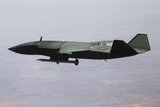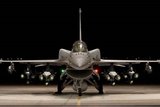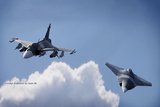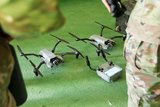Initial F130 engine tests for USAF B-52J bomber due to complete by end 2023
Re-engining the B-52 will extend its service life for 30 years. (Photo: USAF)
In a statement the company said continued rapid twin pod tests at NASA's Stennis Space Center in Mississippi have accomplished all of Rolls-Royce’s initial goals and ‘allowed for the gathering of unprecedented amounts of data early in the program, further de-risking the integration of the F130 engine onto the B-52J'.
Critical design review is expected to begin in the first quarter of 2024 and Rolls-Royce’s supply chain and assembly are also on schedule to deliver ground and flight test engines on time in 2024 through 2026.
In September 2021, Rolls-Royce F130 engines, derived from the BR family of commercial turbofans, were selected by the USAF to replace the existing powerplants in the B-52 fleet, with over 600 new engine deliveries expected.
Related Articles
USAF weighs up concerns and contenders for B-52H engine replacement
B-52H re-engining costs rise by 9%
USAF engine programmes tell a contrasting story
The new engines will extend the life of the B-52 aircraft for 30 years and are so durable they are expected to remain on wing for the remainder of the aircraft life.
In April 2022 Boeing selected Spirit AeroSystems to supply engine pylons and nacelles for the initial phase of the B-52 engine upgrade. Spirit already makes the nacelle for the commercial variant of the engine.
Related Equipment in Defence Insight
More from Air Warfare
-
![Singapore Airshow 2026: Rafael highlights tailored effector solutions for different operational needs]()
Singapore Airshow 2026: Rafael highlights tailored effector solutions for different operational needs
Shephard spoke with Rafael’s CEO about the company’s effector offerings as well as his perspective on one-way attack drones.
-
![World Defense Show 2026: L3Harris to achieve full-rate production of Viper Shield soon]()
World Defense Show 2026: L3Harris to achieve full-rate production of Viper Shield soon
L3Harris has completed the production candidate software load for its Viper Shield airborne electronic warfare system and is conducting sea trials with its VAMPIRE counter-drone system.
-
![Singapore Airshow 2026: Airbus-RSAF H225M teaming tests point to future scalability]()
Singapore Airshow 2026: Airbus-RSAF H225M teaming tests point to future scalability
The tests between a Republic of Singapore Air Force H225M and Airbus Flexrotor uncrewed aerial system were designed to allow the crew to receive and process real-time data from the UAS while maintaining direct command and control.
-
![Singapore Airshow 2026: Saab eyes “share” in future fighter market, targets 2027 CCA demo flight]()
Singapore Airshow 2026: Saab eyes “share” in future fighter market, targets 2027 CCA demo flight
The Swedish government is expected to make a decision on the next steps of the Future Fighter System Concept programme by 2030, with the current second phase focusing on technology knowledge expansion and demonstration flights.
-
![Singapore Airshow: Red Cat ramps up portfolio development amid “key” APAC opportunities]()
Singapore Airshow: Red Cat ramps up portfolio development amid “key” APAC opportunities
In the wake of its 1,842% year-on-year revenue increase in Q4 2025, Red Cat sees mass opportunities in the Asia-Pacific region as the company eyes an ongoing production increase and market growth.

























